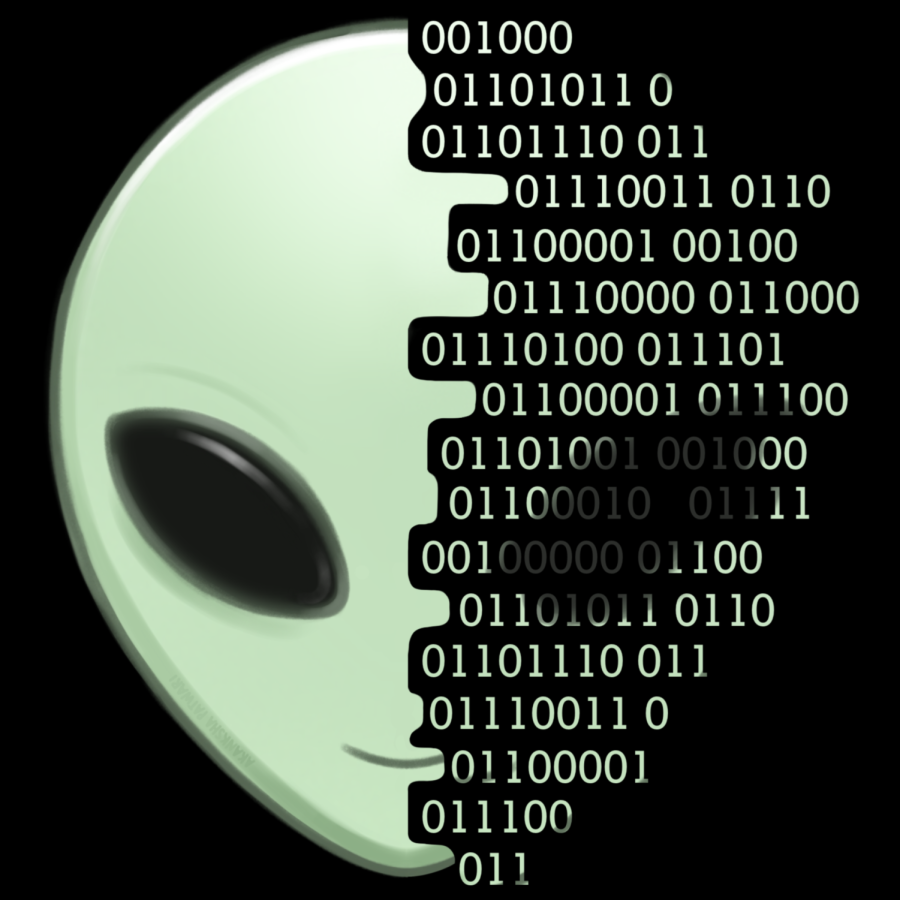Putting the AI in Aliens
An alien?!
April 17, 2023
AI breakthroughs have started to revolutionize many aspects of human life, but there is one field in particular in which AI’s potential discoveries will alter humanity irrevocably: space exploration. The search for aliens, the terrifying answer to the question, “Are we alone in this universe?” has long plagued humanity. As recent developments in AI help realize the possibility of finding alien life, humanity should consider what this would mean for our evolution, and possibly, extinction.
AI applications in the space industry are nothing new. In the past, it has been used to sort data, piece together images, and has even been applied in programming for autonomous systems like NASA’s Curiosity rover. Given how it has made several processes in the industry more efficient, scientists have jumped at the opportunity to apply AI technology to the decades-old endeavor of SETI (Search for Extraterrestrial Intelligence). Programming AI to identify “techno signatures” from piles of radio data from telescopes around the world expedites the search and eliminates human error, which has often led to false detections of microwaves or GPS signals as aliens. These AI programs are also getting better and more refined with time. For example, an algorithm written by Peter Ma from the University of Toronto found eight new signal patterns between 30 to 90 light-years from Earth from existing data that had already been analyzed (and overlooked) without machine learning. Clearly, applying AI to SETI eliminates errors and accelerates the search for alien life.
However, just because we can find aliens does not mean we should. In 1950, Nobel Prize-winning physicist Enrico Fermi introduced the idea that the universe is too big and has too many habitable planets for us to be the only intelligent life to exist. Scientists ever since have expanded on this thought, known as the Fermi Paradox: assuming that aliens do exist, some argue that it is extremely fortunate that we have not crossed paths yet. A particularly famous explanation is Cixin Liu’s “Dark Forest Theory,” which claims that survival is the primary need of any civilization and that they will continuously expand into all the space available to them. This makes sense—after all, humanity has expanded across all reaches of the planet, and our lives have advanced to the point where we have technology that can think for us and further our expansionist pursuits. However, if the Dark Forest Theory is true, the same logic would apply to aliens. A sufficiently advanced civilization will no doubt see Earth as an available space to expand into, thus bringing an end to human civilization. On the other hand, if humans emerge victorious in this battle for resources, it brings us closer to another solution to the Fermi Paradox: the Great Filter. This is an obstacle all forms of life have to overcome to advance. The theory posits that there are so few intelligent life forms that advance past that obstacle, explaining why humanity hasn’t come in contact with any yet. A Great Filter could be a challenge we’ve already overcome, such as evolving from single-celled organisms to multicellular ones. However, finding aliens and expanding into their available space might prove the Great Filter—and the threat of total annihilation—is ahead of us.
Both the Fermi Paradox and its solutions, the Dark Forest and Great Filter, are still only theories. While there is no way of telling what will be true in reality, humanity must consider the possibilities before making decisions that will alter our fate in such drastic ways. Stanford’s annual AI Index found that AI has been advancing considerably faster than traditional processor developments, its computational speed doubling every three months as opposed to the traditional eighteen. This means society is running out of time to decide because the rapid development of AI is pushing boundaries and coming closer and closer to finding aliens. As popular science fiction like ET and Star Wars is, and as exciting the concept of extraterrestrial life is, society should be mature enough to know that rapid developments in technology should be regarded with caution, along with excitement. It isn’t the ideal conclusion, but perhaps the question “Are we alone?” is better left unanswered, by humans and AI.








































